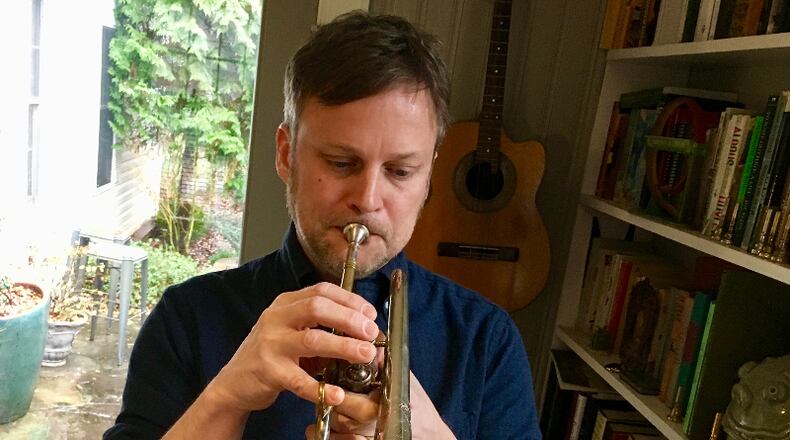When he was about 10 and walking to his school bus stop in Barrington, Ill., Matt Phillips worked out the chord changes of one tune or another on his ever-present harmonica. Or he’d try to remember the far-away, crackly lyrics to songs he’d heard the night before on a Chicago radio program featuring early jazz.
This was the early 1980s. Kids his age were listening to Ray Parker Jr.’s, “Ghostbusters” or Culture Club’s “Karma Chameleon.” But Phillips was mesmerized by the likes of Rudy Vallee or Al Jolson or Edgar Clyde “Skinnay Ennis (who eventually died choking on a chicken bone). These were bandleaders who dated to the 1920s and 30s. Even his dad, Mike Phillips, an advertising man by day and modernist jazz trombonist at night, found the boy something of an enigma.
“You know,” he would tell Matt, “that jazz has made some advances since the 1920s.”
No matter. This theme of the old and often forgotten still informs his life today, whether in the diversity of music he plays or the instruments he repairs.
By profession Phillips is a luthier and part owner of Atlanta Violins in Roswell where he started working in 2000. For a time he tried his hand at advertising, like his dad, and also worked as an illustrator for books and magazines. But the allure of building and repairing violins is that even new instruments are made with 17th century technology.
“Everything, the graduations and varnish are applied by hand,” he said. “We use knives, files and scrapers. We use [horse] hide glue that is brittle but strong. So if the weather is humid or dry, and the wood expands or contracts, instead of the body cracking and possibly getting ruined, the seams will separate neatly and you can glue it back together.
“Bottom line,” he added, “if the lights go off or the internet goes down, we keep working.”
In his spare time Phillips repairs and builds an array of instruments in the converted garage/workshop next to his Decatur home. In various states of repair he has vintage guitars, mandolins, trumpets, cornets, ukuleles and hybrid instruments of his invention he calls “Frankensteins.”
He’s even repaired a rare Kameraphone, dating from the late 1920s, a portable Victrola phonograph that plays 78 rpm records. The entire apparatus, silver tone arm and all, folds neatly into a compact box that resembles a Brownie camera, though it doesn’t actually take photographs.
His studio ceiling is lined with jars full of period screws, nuts, bolts, antique bridges and antique tuners.
“It started out where I’d buy a broken instrument, fix it, sell it to a musician then buy a better broken one,” he said. “Most of these I pick up at auctions and estate sales. There’s a romance to it. My work brings back into daily use an instrument that hasn’t been played in decades.”
This, possibly, is the whole point to Phillips’ work. The old and forgotten are burnished, authentic, certainly nostalgic, but they can also become eerily alive. Take Bix Beiderbecke’s cornet solo on “I’m Coming Virginia”— possibly Phillips’ favorite son g— though recorded over 90 years ago still detonates on every hearing.
Phillips loves playing a circa 1900 Boston Three Star, preferred cornet for Herbert Clark, star of John Phillip Souza’s 1890s bands. He’s also partial to the tenor guitar, with a smallish body and four-string fret board, like banjo, that produces a startling resonance.
He seems to have played in every kind of roots band the metro area offers, from the Atlanta Mandolin Orchestra for 10 years, to bluegrass bands, folk rock, old-time hillbilly, ska bands, Celtic bands and of course his favorite, early jazz.
He plays in New Orleans style jam sessions on Mondays with a collective calling themselves The Clams. The designation originated with Beiderbecke himself, who called a bad note a “clam,” and sessions with a series of misplays a “clambake.”
“There’s just a pure fun to that kind of playing,” Phillips said. “I just sort of go into automatic pilot and there is no competition and no egos. And, yeah, plenty of bad notes.”
About the Author
The Latest
Featured


